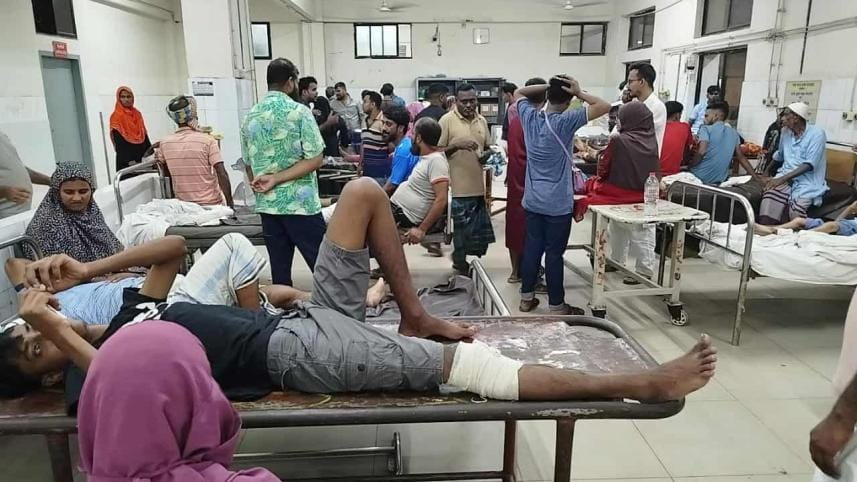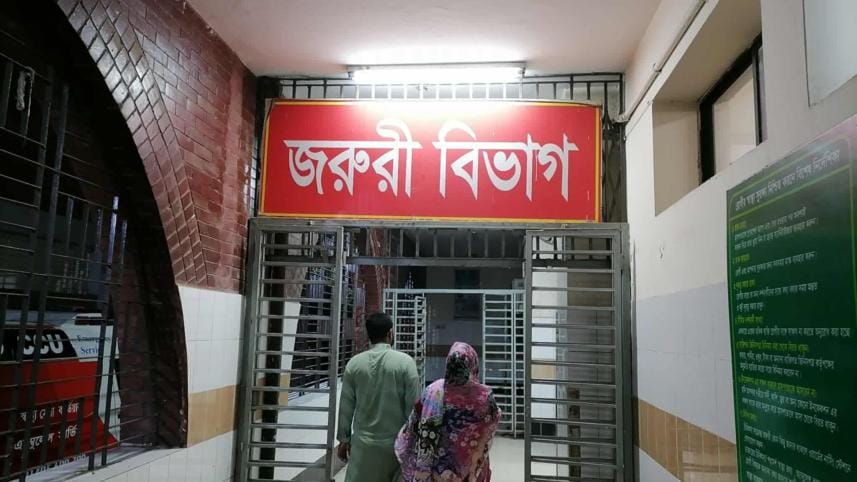An Eid evening at Pongu Hospital: overflowing emergency, lingering waits

Sufia Begum, a 55-year-old woman from Sreenagar upazila in Munshiganj, suffered severe injuries to her right hand when a motorcycle struck her around 4:00pm on the Day of Eid-ul-Azha (Saturday) when she was crossing a road nearby her home.
She was rushed to a local hospital, but no doctors were available there due to the Eid holiday. The staffers there asked Sufia's family to take her to Pongu Hospital, formally known as the National Institute of Traumatology and Orthopaedic Rehabilitation (NITOR), in the capital.
NITOR is a 1,000-bed tertiary medical facility that receives referral patients from all over the country. It handles over 250 emergency patients, over 1,000 outpatient cases, and performs more than 100 major surgeries daily, according to its website.

Sufia was taken to NITOR, and when our correspondent found her at the hospital around 7:30pm, she was lying on a stretcher in an overcrowded emergency room.
There are nine beds in the room, but the number of patients was more than double, with many lying on stretchers or sitting on chairs. A few were even seen standing with bandaged limbs.
"We submitted our token about half an hour ago, but still no doctor has visited her," Sufia's son-in-law Md Hasan said as she cried in pain.
After some time, a doctor visited and examined her. The doctor then checked several other patients, apparently following the tokens.
From outside the doctor's room, through a window, our correspondent witnessed that four doctors continuously reviewing X-rays and other documents of patients and providing necessary suggestions. Nurses, assisted by ward boys, were seen applying bandages to patients, many of whom were crying out of their hearts due to pain.

A nurse at the reception said that over 250 patients had already arrived at the emergency ward between 12:01am and 7:30pm that day. "This number is higher than usual time," she said, requesting anonymity since the hospital authorities prohibit staff from speaking to the media.
Two notices from 2024 posted near the doctor's room mentioned that only the hospital director holds the authority to speak to the media.
"Most of the patients came with injuries due to road crashes or accidents while cutting sacrificial animals," she added.
Within half an hour, four to five new patients joined the crowd.
At the emergency department, four doctors, five nurses, and five ward boys were working during that particular shift, another nurse said.
Outside the emergency department, other parts of the hospital were relatively calm, with fewer inpatients, while outdoor activities were fully suspended.
During a visit to two inpatient wards, our correspondent found several empty beds. A nurse there said 64 patients were receiving treatment at that time, against a capacity of 84. Only seven nurses, all non-Muslim, were on duty in three shifts, she added. During normal times, 19 nurses work in that ward.
Around 8:00pm, over a dozen patients were seen outside the emergency operation theatre room. Some were sitting on the floor with bandaged limbs. An Ansar personnel deployed there said three doctors were working inside the operation theatre, and only one OT was operational.
Fatema Begum, 50, sustained injuries to her left leg when an auto-rickshaw hit her near her house in Bandar Upazila of Narayanganj, yesterday afternoon. Her family took her to NITOR sometime after 2:00pm. After a preliminary check, doctors in the emergency ward sent her for an operation.
"We've been waiting for her operation for over four hours, but we still haven't been called for the procedure," said the patient's nephew Abdul Hannan said around 8:00pm.
However, the Ansar personnel refuted this claim, stating they had been waiting no longer than one hour.
Meanwhile, Obaidul Islam, 25, said he has been waiting for around nine hours for his operation. A resident of Dhaka's Green Road, he came to the hospital around 11:00am after a cow hit him, fracturing his right hand.
"I haven't been called in yet because the doctors have deemed mine to be less urgent," Obaidul told this newspaper in front of the OT room.
When contacted, the hospital's director, Prof Abul Kenan, said the number of patients usually increases during the Eid holiday.
While he did not explain the reason for the rise, staff at the hospital mentioned that road accidents increase during Eid, contributing to the surge in patient numbers. Additionally, more patients from upazila and district-level hospitals are referred to NITOR because doctors are unavailable during the holiday period.
Prof Kenan mentioned that the emergency ward typically handles 250 patients daily during normal times, but this number rises to over 300 during the Eid holiday. Ten days Eid vacation started from Thursday.
He said that 45 doctors were deployed for three shifts in the emergency department, including the operation theatres during the vacation. However, these correspondents found only four doctors in the emergency ward and learned from the Ansar personnel that three doctors were working inside the OT.
Though the Ansar personnel stated that only one OT was operational, Prof Kenan claimed that six beds in three operation theatres were ready for use.
"Perhaps the other doctors were resting when you visited the hospital," he told The Daily Star late last night.
He also mentioned that the number of inpatients was lower than usual. "We are trying our best to provide emergency services. Operation theatres are ready round the clock," he added.





 For all latest news, follow The Daily Star's Google News channel.
For all latest news, follow The Daily Star's Google News channel.
Comments